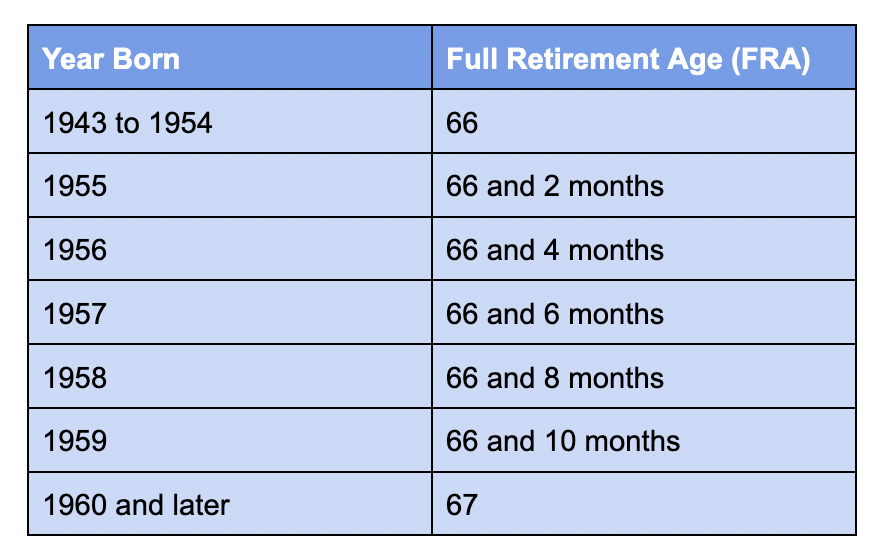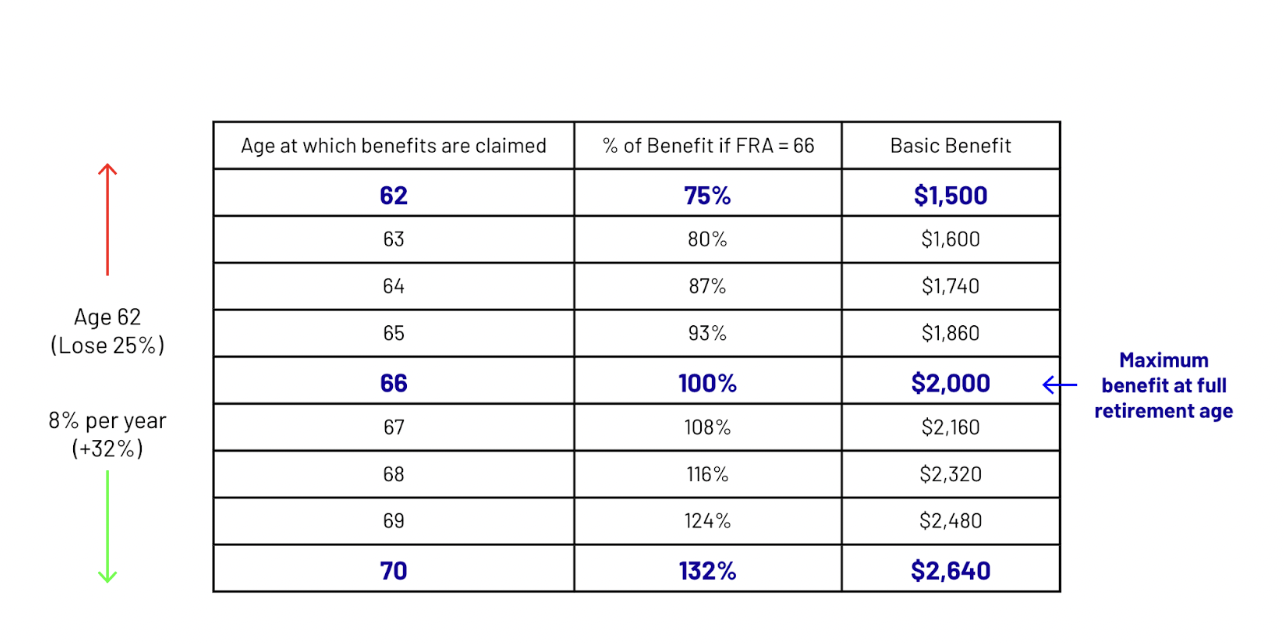
The years leading up to retirement can be both exciting and overwhelming. While you look forward to a new chapter, the stress of making it happen and the confusion around the Social Security process can make it feel like a challenge. It’s especially tough when it seems like everyone else has it all figured out while you’re still trying to navigate the path.
In the wake of the Great Resignation in 2021 and 2022, as many left the workforce post-pandemic, understanding your Social Security benefits—and how to make the most of them—is more critical than ever.
This comprehensive guide is designed to help our clients feel confident and prepared to fully take advantage of their Social Security benefits as they transition into this exciting next phase of life.
Your Social Security benefits are calculated by the Social Security Administration (SSA). Benefits are based on lifetime earnings across your 35 highest earning years. You must work a minimum of 10 years to be eligible for benefits. If you have worked less than 35 years, your earnings will be calculated with zeros for the years you have not worked. All past wages are indexed to today’s wages in order to accurately reflect wage growth.
Once your average monthly earnings for your top 35 years are calculated, a special formula is applied and the result is your primary insurance amount (PIA). The PIA is the benefit you are eligible to receive when you reach full retirement age (FRA).
The actual benefit you receive may not be your PIA. This is because your PIA will be increased or decreased depending on when you choose to receive benefits. Taking benefits before FRA will reduce your benefit, and waiting until after FRA will increase your monthly benefit. Also, starting at age 62, your eligible benefits will receive regular cost-of-living adjustments (COLA).
Married people are eligible for benefits based on their spouse’s work history. The spousal benefit is 50% of the working spouse’s earned benefit. In order to receive these benefits, the working spouse must be at least 62 and have already filed for benefits.
If you are divorced, you may also be eligible to receive spousal benefits based on your ex-spouse’s work history. Your marriage needs to have lasted at least 10 years, you must be divorced for at least two years, and you must still be single. In addition, you need to be at least 62 and not eligible for a higher benefit amount based on your own work record. Unlike spousal benefits for married people, your ex-spouse does not need to have filed for benefits in order for you to claim them.
You can claim your Social Security benefits anytime between age 62 and age 70. If you continue to delay taking benefits after you reach age 70, there is no additional benefit increase. However, the age at which you choose to collect benefits before 70 will impact the amount of benefit you receive.
You can start receiving benefits as early as 62, but your monthly benefit will be lower than if you waited longer. Your basic benefit is reduced a fraction of a percent for each month you begin receiving benefits prior to full retirement age. Retiring early can permanently reduce your benefit by up to 30%.
Your full retirement age (FRA) changes based on the year you were born. FRA is 66 for those born between 1943 and 1954 and increases by two months for every year after that you were born until it settles at age 67 for those born in 1960 or later. If you wait until you reach full retirement age to begin collecting your Social Security benefits, you will receive the full PIA that you have earned.

If you’re still working or don’t need the money immediately, you can delay receiving your benefits. Your benefit will increase by 8% for each year that you delay, with a maximum possible increase of 32%. You cannot delay and increase your benefit indefinitely, though. Once you reach age 70, the amount of benefits you receive will not increase any further.
Your Social Security benefit is based on your 35 highest-earning years, so continuing to work and earning a higher salary can replace lower-earning years in your calculation, ultimately increasing your future benefit. Once you stop working, your benefit amount is set based on your earnings record, but your claiming age still plays a vital role. Claiming benefits before full retirement age reduces your monthly payments, while delaying benefits beyond FRA can increase them by up to 8% per year until age 70. Understanding these factors can help you make a more informed decision about when to claim.
An important document that you will reference during the decision-making process is your Social Security statement. The Social Security Administration mails statements to workers age 60 and over who aren’t receiving Social Security benefits and do not yet have a my Social Security account. These statements will be mailed out three months prior to your birthday, but you can also access the same information by setting up an account on their website.
The statement will tell you your:
All benefit amounts listed are estimates and subject to change. They are calculated based on your date of birth and future estimated taxable earnings.
It is important to review your earnings history and check for accuracy. Your benefit is calculated based on those numbers, so any mistakes can affect your benefits. You should correct any errors as soon as possible.
Your Social Security benefits are calculated using complex actuarial equations based on life expectancy and estimated rates of return. They are not designed to encourage early or late retirement. If you live as long as anticipated, the total amount you receive over your lifetime should be about the same whether you claim it at age 62, age 70, or sometime in between. You will either receive the money as a smaller monthly payment over a longer period of time or a larger monthly payment over a shorter period of time.
The best time for you to claim your benefits depends on your personal situation and health. If you expect to live longer than average, your overall lifetime benefit will be greater if you delay claiming your benefits to increase your benefit amount. If the opposite is true and you see little chance of making it into your mid-80s, you would likely receive a greater lifetime benefit by taking it sooner, even though it would be a smaller monthly payment.
When to Start Benefits: The Longer You Wait, the Larger the Benefit

Once you decide when you want to start receiving benefits, remember to complete your application three months before the month in which you want your retirement benefits to begin.
Because married people have the ability to receive their own benefit or a spousal benefit, they have more to consider when filing for benefits. With the right strategy, married couples can maximize their benefits.
In the majority of cases, the lower-earning spouse may want to begin collecting benefits early while the higher-earning spouse waits as long as possible. That way, you can access the lesser benefit while maximizing the higher benefit.
Often, it is the husband with the higher benefit and the wife with the lower one. Women also tend to live longer than men. By following this strategy of waiting as long as possible to claim the higher benefit, you not only maximize the husband’s retirement benefit for use while he is alive, but it also maximizes the wife’s survivor benefit when he passes away.
Once a popular way to maximize Social Security benefits, this strategy is now only available to those born before January 2, 1954. Since everyone who qualified would now be at least 70 and likely already claiming benefits, this option is no longer actionable for new retirees. However, understanding past claiming strategies highlights how Social Security rules have evolved over time, reinforcing the importance of staying informed about current options.
Working does not affect your benefits once you reach FRA, but it does before that. Only earned income, such as wages and self-employment earnings, affects your Social Security benefits. Income from investments, pensions, and annuities do not affect Social Security benefits.
When you are under FRA for the whole year, your Social Security benefit is reduced by $1 for every $2 you earn over $21,240. In the year that you reach FRA, your benefit is reduced by $1 for every $3 you earn over $56,520. Once you reach FRA, your benefit is no longer reduced no matter how much you earn. These dollar amounts adjust each year, so your benefit may change in following years.
The 2025 COLA is 2.5%, slightly lower than 2024’s increase of 3.2%. There is also an increase in the Social Security tax cap. The cap is increased from $160,200 to $168,600, meaning Social Security taxes will not be withheld from income earned above that amount.
This substantial increase in benefits will hopefully provide retirees some relief from the rising cost of goods and services. Historically, a COLA that fails to keep pace with inflation only serves to exacerbate financial hardships. It’s important to keep in mind that the COLA will affect pre-retirees and retirees differently. Here’s what to expect based on where you are in your retirement journey.
While this increase is good news for retirees, it’s not a license to change spending habits all that much—as most retirees know all too well.
It will still be necessary to keep track of your finances, spending—and, importantly, your tax liabilities; some beneficiaries could experience increased taxes in the coming years, depending on their thresholds.
Retirees who have not started claiming Social Security will still reap the benefits of this increase even if they don’t take Social Security this year. There is never a decrease in the COLA, so the higher payments are here to stay.
Additionally, the recent elimination of the Pension Offset and Windfall provisions has provided new opportunities for many government workers. These provisions previously reduced Social Security benefits for individuals with pensions from non-Social Security-covered employment. With their removal, affected workers can now receive their full Social Security benefits without reduction, significantly enhancing their financial security during retirement. This change is particularly important for those who have spent significant time in government roles, allowing them to enjoy the benefits they’ve earned.
Keep in mind that, in some cases, it’s worth holding off on taking Social Security for several years once you’re eligible, as discussed above. Of course, the benefits of doing so vary based on individual circumstances.
The timing and method of claiming your Social Security benefits could be one of the most crucial decisions you’ll make for your retirement, depending on your savings. Given the importance and complexity of this choice, it’s wise to speak with a skilled financial advisor before you move forward.
At Wealth Advocate Group, we can guide you through the Social Security process, helping you feel confident and well-prepared for the next phase of your life. If you’re approaching retirement and wondering how Social Security fits into your overall plan, we’d love to help. Call 440-505-5751 or email jcohen@Wadvocate.com to schedule an appointment.
Jason Cohen is Chief Operating Officer and wealth advisor at Wealth Advocate Group, LLC, an independent, fee-based wealth management company. Jason has 15 years of experience and spends his days managing firm operations, including portfolio trading and analysis, training of new advisors, financial plan production, and client relationship management. Jason specializes in serving real estate professionals and other independent contractor business owners, helping them navigate their unique financial challenges, such as unpredictable cash flow and tax issues, so they can pursue financial independence. Jason has a bachelor’s degree in public management from Indiana University and is a CERTIFIED FINANCIAL PLANNER® professional and believes that everyone should have access to comprehensive financial planning. He is passionate about doing his best for his clients and setting others up for success. Outside of the office, you can find Jason staying active in a variety of sports and spending time with friends and family. Learn more about Jason by connecting with him on LinkedIn.
When you link to any of the websites mentioned, we make no representation as to the completeness or accuracy of information provided at these websites. The opinions found therein are those of the author(s) of the article or website.